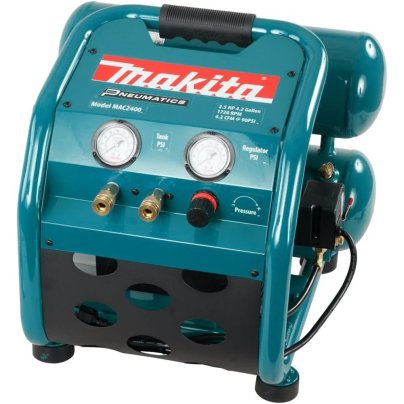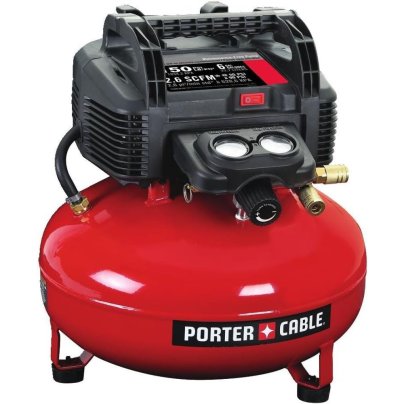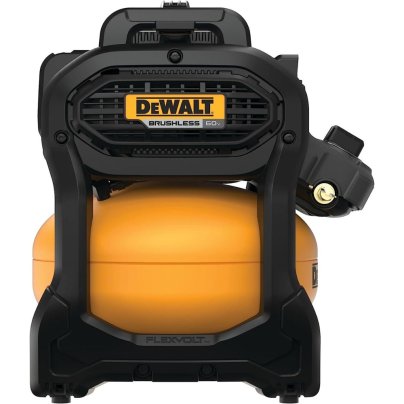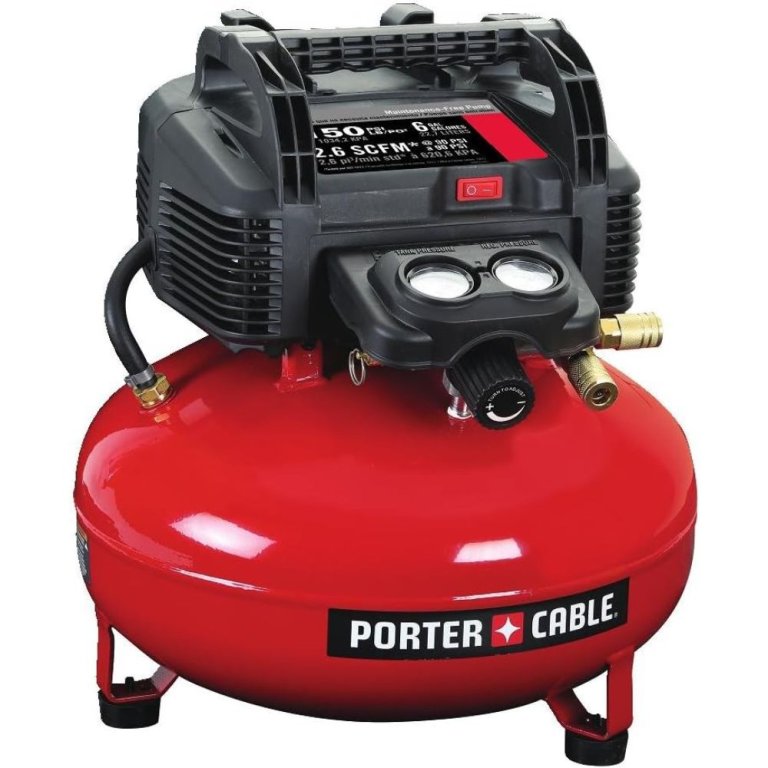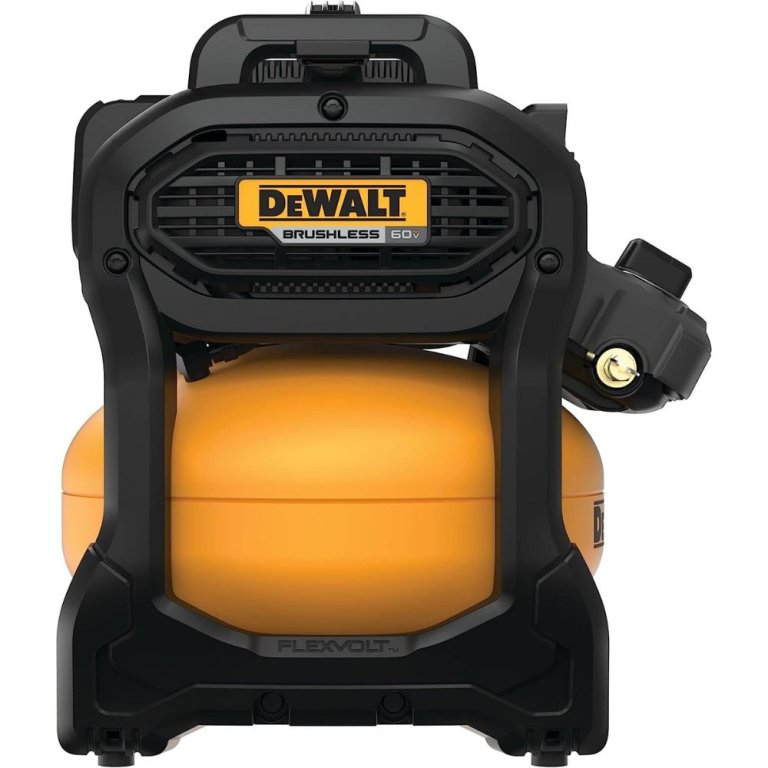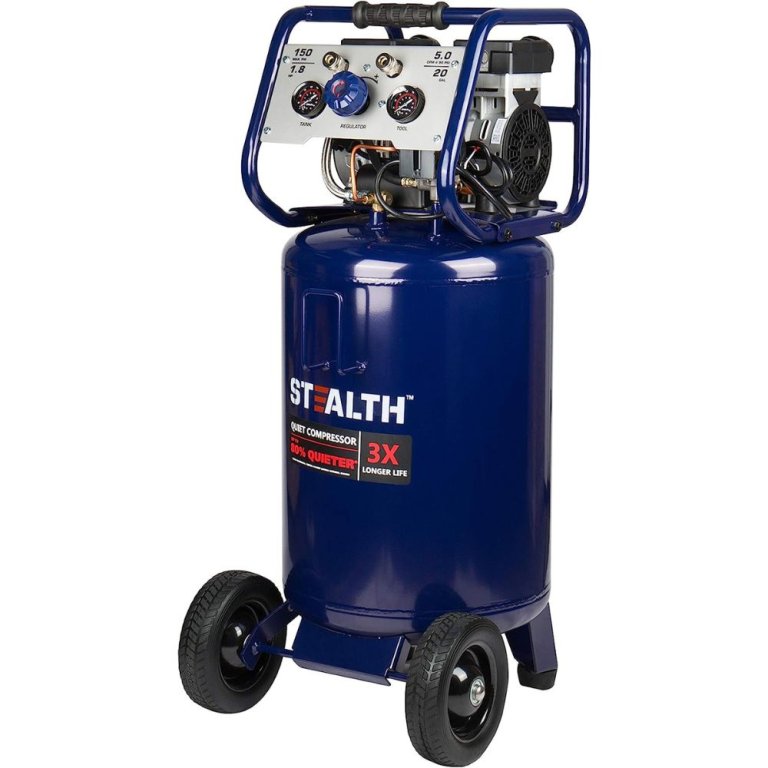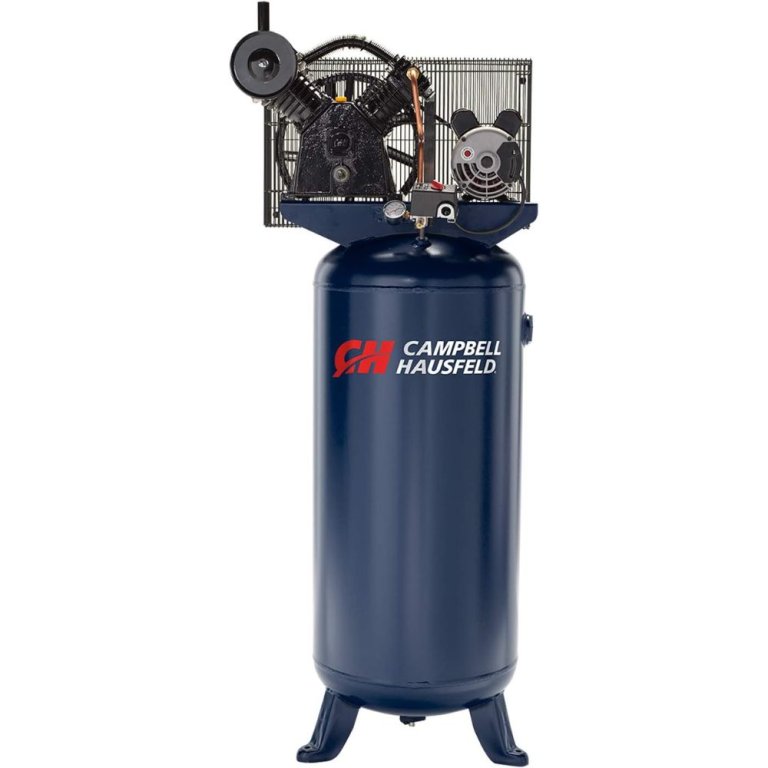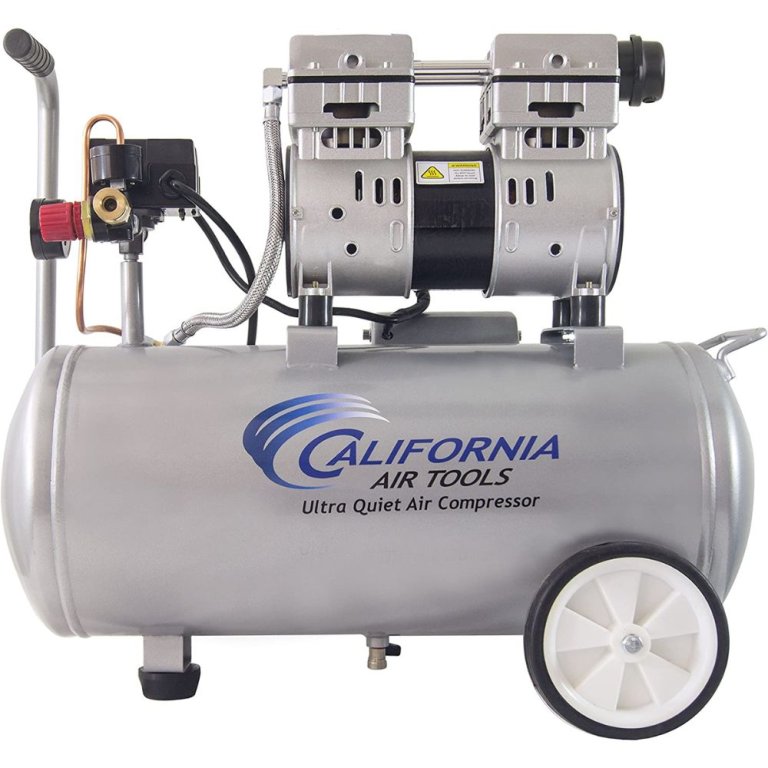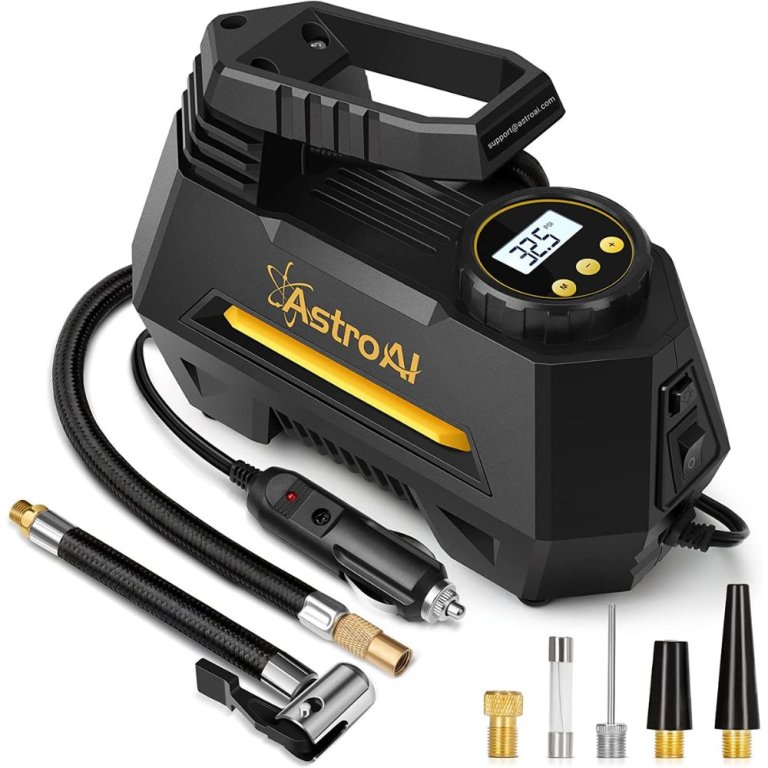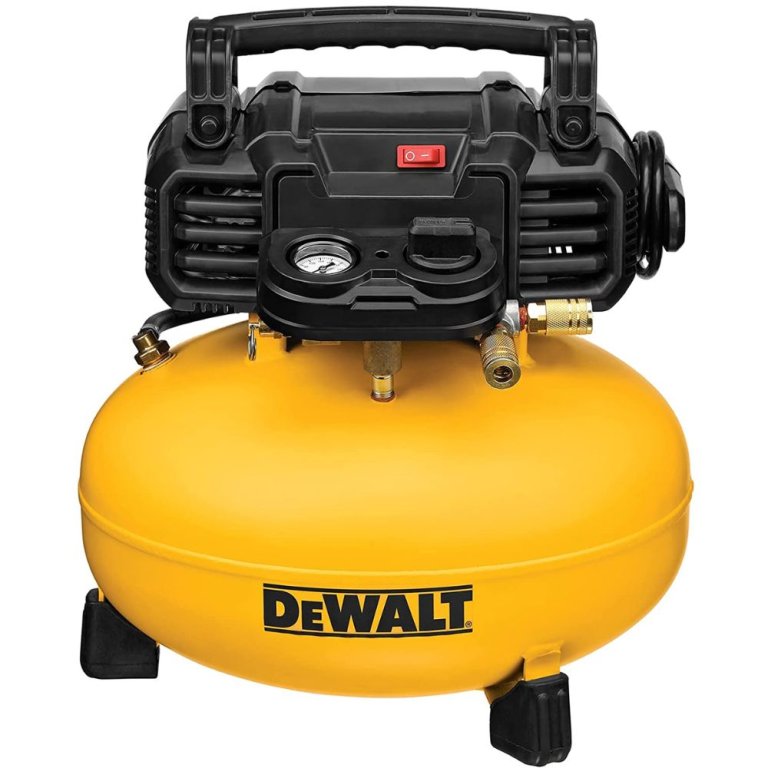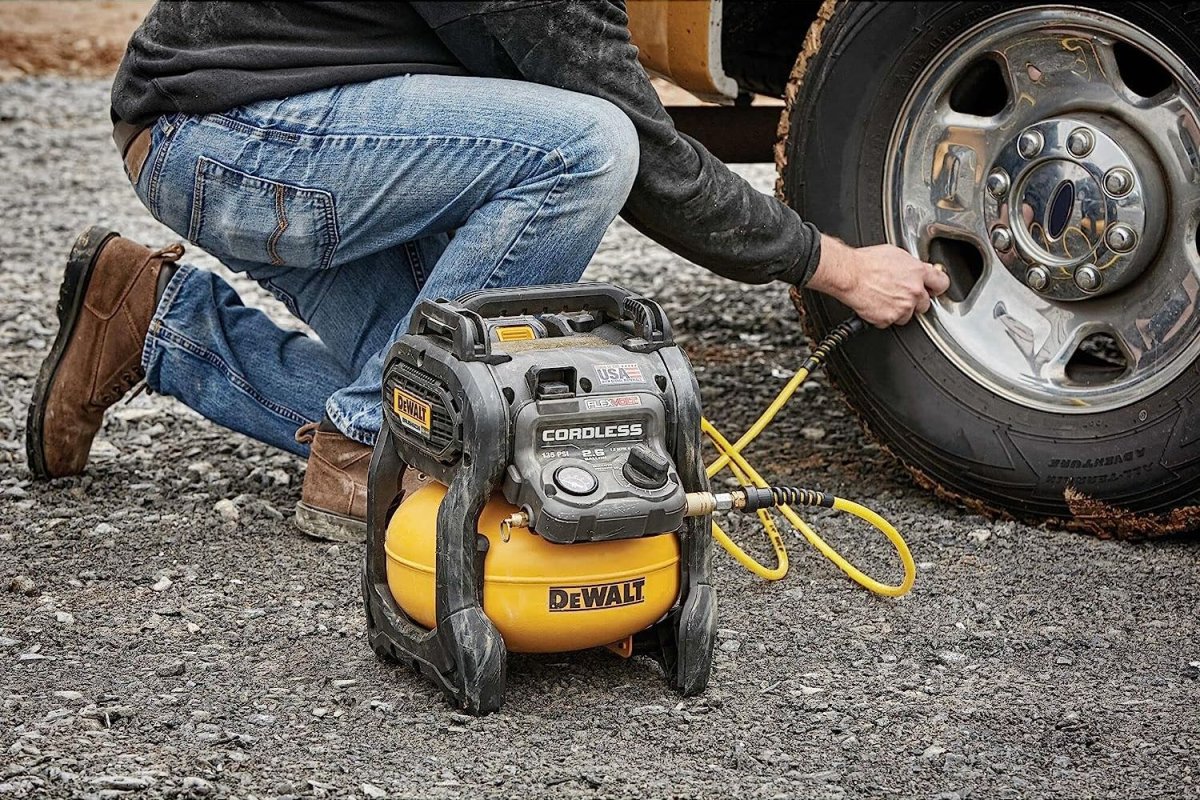
We may earn revenue from the products available on this page and participate in affiliate programs. Learn More ›
Those who have never owned an air compressor for home garage use might not realize the flexible uses the tool can provide. An air compressor can power a paint or varnish sprayer, an impact wrench, a sander for metal or wood, a variety of nailers, saws, and more. They inflate a flat tire too, of course. The air tools that go with compressors are usually less expensive than their electric or cordless counterparts, yet still very tough. It’s arguably the most affordable way to have professional-grade tools at home.
But while getting a compressor for the garage is a great idea, the variety available can make choosing the right model difficult. Which type is best? What kind of pressure output is needed? How noisy will it be?
In this guide, we answer these and other important questions that crop up. We have also put together a comprehensive list of what we believe are the best air compressors for home garage use on the market.
- BEST OVERALL: Makita MAC2400 2.5 hp Big Bore Air Compressor
- BEST BANG FOR THE BUCK: Porter-Cable 6-Gallon Oil-Free Pancake Compressor
- BEST PORTABLE: DeWalt 2.5-Gallon Cordless Air Compressor Kit
- BEST QUIET: California Air Tools 10020C Quiet Air Compressor
- BEST 20-GALLON: Stealth Professional 20-Gallon Quiet Air Compressor
- BEST 60-GALLON: Campbell Hausfeld 60-Gallon 2-Stage Air Compressor
- BEST HORIZONTAL: California Air Tools 8010 Oil-Free Air Compressor
- BEST INFLATOR: AstroAI Portable Air Compressor
- ALSO CONSIDER: DeWalt Heavy-Duty Pancake Compressor

How We Chose the Best Air Compressors for Home Garages
I’m a mechanical engineer by trade, so I have a thorough understanding of how air compressors work. I’ve owned several, which I’ve used in my wood shop, for home remodeling, and when tinkering with cars and motorcycles.
To supplement my own knowledge, the Bob Vila team researched all the leading manufacturers and their product ranges to make sure we were up to date with the latest developments. To make it onto our curated list, air compressors had to have proven reliability, ease of use, and performance appropriate to the task expected of it. Price is always a key element, but while we looked for opportunities to save money, our priorities were durability and long-term value.
Our Top Picks
The following selections include everything from lightweight portable air compressors to big upright models for heavy-duty tasks. The result is a list of products that should meet the individual needs of all shoppers. We’ve assigned a category to each product to make it quick and easy to find the best air compressor for your home garage.
Best Overall
Makita MAC2400 2.5 hp Big Bore Air Compressor
Pros
- A high-quality all-around compressor that can power a variety of garage tools
- Oil-lubricated pump with Big Bore cylinder and piston run cooler for longer life
- Built-in roll cage offers protection in tough working environments like jobsites
Cons
- Faults are few, but it is quite expensive for its size
Product Specs
- Performance: 4.2 CFM at 90 psi
- Noise: 79 decibels
- Weight: 77 pounds
With so many models to choose from, it’s tough to pick a single best compressor for home garages. We picked the Makita because it comes from a manufacturer known for reliability and durability, and it offers tremendous versatility.
With 4.2 cubic feet per minute (CFM) of airflow volume available, the compressor can supply power tools like impact wrenches, sanders, and nailers. The Big Bore, oil-lubricated pump design has high capacity for fast recovery time, and has cast-iron components to reduce wear. The twin tanks allow one to fill while the other is in use, thus reducing downtime. Maximum pressure is 130 pounds per square inch (psi).
At 77 pounds, this compact air compressor is light enough to move when required, and a built-in roll cage helps protect it from damage. Since it runs at a relatively low rpm (revolutions per minute), the noise level is only 79 decibels, so while it’s not the quietest model, it’s not so loud as to be unpleasant.
Get the Makita air compressor for home garages at Amazon, The Home Depot, or Acme Tools.
Best Bang for the Buck
Porter-Cable 6-Gallon Oil-Free Pancake Compressor
Pros
- A lightweight tool with built-in carry handle that comes with a competitive price tag
- Low-maintenance oil-free pump produces 150 psi for extended runtimes
- Pancake design provides stability, rubber feet protect floors, and there’s an integrated cord wrap
Cons
- Although complaints aren’t common, some found it noisy, and air leaks might occur.
Product Specs
- Performance: 2.6 SCFM at 90 psi
- Noise: 82 decibels
- Weight: 30 pounds
Porter-Cable is a brand known for well-designed, competitively priced equipment, and its popular pancake air compressor is a good example. It is very stable, yet at just 30 pounds it’s easy to move around, especially with its built-in carry handle and cord wrap. The low-amp motor won’t trip breakers on startup, and oil-free pumps like this one should have a long life with minimal maintenance.
With a maximum air pressure of 150 psi, the 6-gallon tank fills and recovers quickly. An output of 2.6 CFM is plenty for inflating tires, and it should run flooring or framing nailers, though it probably isn’t sufficient for wrenches or sanders. Porter-Cable doesn’t provide a noise rating, but one retailer rates it at 82 decibels, which is a little louder than most.
Get the Porter-Cable air compressor for home garages at The Home Depot or Walmart.
Best Portable
DeWalt 2.5-Gallon Cordless Air Compressor Kit
Pros
- Offers unrivaled cordless portability and has heavy-duty roll cage for protection
- High-efficiency brushless motor maximizes battery life, while oil-free pump minimizes maintenance
- Kit includes one 60-volt 2.0Ah lithium ion battery and a fan-assisted fast charger
Cons
- Performance is modest for its premium price tag, and spare batteries are expensive
Product Specs
- Performance: 1.2 SCFM at 90 psi
- Noise: 79 decibels
- Weight: 21.5 pounds
When maximum portability is demanded, it’s rare to beat a cordless tool. With no need to plug it in to fill up the tank, the DeWalt can be used anywhere. Plus, at just 21.5 pounds, it is one of the lightest air compressors on the market. With a built-in roll cage, it’s designed to take a few knocks, too.
Output of this compressor is 1.2 SCFM at 90 psi, with a 135 psi maximum. It will inflate tires easily and can be used with nailers and low-consumption air tools. It would struggle with mechanics’ favorites like impact wrenches, however. A fast charger and one battery are included. Frequent users will probably want a spare which will make the DeWalt a more expensive choice.
Get the DeWalt air compressor for home garages at Amazon, The Home Depot, or Acme Tools.
Best Quiet
California Air Tools 10020C Quiet Air Compressor
Pros
- A high-performance upright air compressor that runs at just 70 decibels
- Dual-piston pump is engineered for durability and rapid filling of 10-gallon tank
- Can run continuously at low CFM and for over 30 minutes at 5.3 CFM
Cons
- Most users find it reliable, but a few reports of defects suggest inconsistent quality control
Product Specs
- Performance: 5.3 CFM at 90 psi
- Noise: 70 decibels
- Weight: 82.5 pounds
The California Air Tools Ultra Quiet range of air compressors manage to combine impressive power with noise levels that make them a pleasure to work with in the garage. This 10-gallon, oil-free model delivers 5.3 CFM at 90 psi, and while maximum pressure might seem modest at 125 psi, it still fills the big tank in under 2 minutes. There are one or two quieter models than the California Air Tools 10020C, but none that deliver this level of consistent performance. It is capable of running continuously for 30 minutes or more.
The dual-piston pump is engineered for durability. An easy start valve reduces the initial amperage draw so it won’t trip breakers. Although this compressor weighs 82.5 pounds, it has wheels with rubber tires so it’s not difficult to move around. It also comes with a useful 25 feet of power cord.
Get the California Air Tools 10020C compressor for home garages at Amazon, Tractor Supply Co., or The Home Depot.
Best 20-Gallon
Stealth Professional 20-Gallon Quiet Air Compressor
Pros
- High-capacity, pro-rated compressor that’s quiet enough to not upset the neighbors
- Reliable workhorse that delivers consistent pressure from a low-maintenance, oil-free motor
- 8-inch rubber wheels offer good grip on garage floors to help mobility when necessary
Cons
- Breakdowns are unusual, but when they do happen, some owners say customer support is poor
Product Specs
- Performance: 5.0 CFM at 90 psi
- Noise: 70 decibels
- Weight: 130 pounds
The purpose of high-capacity, pro-rated models like the Stealth 20-gallon air compressor isn’t necessarily to produce greater airflow or pressure, but to deliver consistent output so there are fewer interruptions while waiting for the tank to fill. Performance figures are impressive nevertheless, with 5 CFM at 90 psi and maximum pressure of 150 psi. When running at 90 psi, the Stealth is actually capable of delivering more than 36 gallons of air per minute, with a noise level of just 70 decibels.
Capacity is such that the Stealth could often accommodate two users, and a pair of quick couplers allow for this. They also provide for rapid changing between tools. Its 8-inch rubber wheels give high traction for moving the 130-pound tool when necessary. We did find it a little surprising that the power cord is only 6 feet long, but it’s a minor frustration.
Get the Stealth air compressor for home garages at Amazon or The Home Depot.
Best 60-Gallon
Campbell Hausfeld 60-Gallon 2-Stage Air Compressor
Pros
- 2-stage pump fills the big tank quickly and delivers the consistent output pros demand
- Has powerful and reliable 3.7 hp induction motor delivering up to 175 psi
- CFM rating is sufficient for heavy-duty garage tools, large nailers, and furniture spray equipment
Cons
- Requires 230V supply, and we suspect the price will be beyond many home mechanics
Product Specs
- Performance: 7.5 SCFM at 90 psi
- Noise: 65 decibels
- Weight: 336 pounds
Those who spend a lot of time in the home garage might want to consider this high-performance air compressor from Campbell Hausfeld. It delivers 7.5 SCFM at 90 psi and a 175 psi maximum. The powerful 3.7 horsepower (hp) induction motor drives a 2-stage cast-iron pump, filling the 60-gallon tank much more rapidly than single-stage rivals. It then delivers consistent output whether driving wrenches, grinders, sanders, spray equipment, or nail guns.
The Campbell Hausfeld 60-gallon air compressor weighs 336 pounds, so it needs a permanent position; however, its upright design has a relatively small footprint. It also requires a 230-volt (V) outlet. It is a sizable investment, but it’s built in the USA to commercial standards.
Get the Campbell Hausfeld air compressor for home garages at Amazon, Lowe’s, or The Home Depot.
Best Horizontal
California Air Tools 8010 Oil-Free Air Compressor
Pros
- Popular alternative to pancake compressors with wheels and lifting handle for easy mobility
- Oil-free, dual-piston pump should ensure reliability and long working life
- Low-rpm motor helps keep noise down to just 60 decibels
Cons
- Although competitively priced, the relatively low CFM restricts the tools it can power
Product Specs
- Performance: 2.2 CFM at 90 psi
- Noise: 60 decibels
- Weight: 48 pounds
This 8-gallon horizontal air compressor is another one from the California Air Tools Ultra Quiet range, and this model produces just 60 decibels of noise. Horizontal tanks are a popular alternative to pancake compressors because although CFM and psi are similar, horizontal compressors usually offer higher capacity. As a result, they can run longer and have shorter recovery times. Output figures for this model are 2.2 CFM at 90 psi, with a maximum pressure of 120 psi. An oil-free, dual-piston pump delivers consistently reliable performance.
One downside of horizontal tanks is that they tend to be larger and heavier than pancake compressors. However, at 48 pounds, this California Air Tools model is lighter than some competitors, and wheels and a lifting handle contribute to its portability. This is a good choice for many everyday tasks, and competitively priced, though the modest CFM is insufficient for heavy-duty tools.
Get the California Air Tools 8010 compressor for home garages at Amazon, The Home Depot, or Walmart.
Best Inflator
AstroAI Portable Air Compressor
Pros
- An efficient tire inflator that plugs directly into vehicle’s 12-volt DC socket
- Programmable inflation with auto shutoff when correct pressure is reached
- Comes with standard tire valve, several other inflation nozzles, and a spare fuse
Cons
- A few fault reports, but given its popularity and high use, this is almost inevitable
Product Specs
- Performance: CFM not relevant; max 100 psi
- Noise: 80 decibels
- Weight: 2.2 pounds
No review of the best air compressor for home garages would be complete without a tire inflator. They may not be the most interesting of tools but nearly everyone needs one for an occasional low or flat tire, and the AstroAI has a number of features that raise it above competitors.
This portable compressor plugs directly into a vehicle’s 12-volt DC socket (cigarette lighter), and it can give an immediate digital indication of tire pressure in psi, kilopascal (kPa), bar, or kilogram force per square centimeter (KG/CM²). Readings are accurate to within 1.5 percent. A user can then set the inflator to the desired pressure using simple plus and minus buttons, and it will shut off automatically when the tire is inflated to that point. A standard tire valve and nozzles for a variety of balls, air mattresses, and other inflatable items also come with the compressor, plus a spare fuse is included. It is even available in four accent colors.
Get the AstroAI air compressor for home garages at Amazon or Walmart.
Also Consider
DeWalt Heavy-Duty Pancake Compressor
Pros
- Heavy-duty, DeWalt-quality pancake compressor with a budget-friendly price tag
- Long-life oil-free pump, and twin couplers support 2 users
- Weighs just 30 pounds and has a convenient carry handle and cord wrap
Cons
- Although typically reliable, a few have not worked on arrival or failed shortly thereafter
Product Specs
- Performance: 2.6 SCFM at 90 psi
- Noise: 75.5 decibels
- Weight: 30 pounds
Pancake compressors might not run heavy-duty garage tools, but with their compact size, relatively light weight, and versatility, they are a popular choice for home garages and general DIY purposes. The 6-gallon DeWalt is a good example. It has the brand’s well-known build quality with an oil-free pump for long-term durability. The compressor weighs 30 pounds and has a convenient carry handle.
Performance is 2.6 SCFM at 90 psi. The maximum output is 165 psi, so the tank will fill quickly. It has dual couplers—which is unusual for a compressor this size—so two people could work together, depending on tool demands. Given the budget-friendly price, the DeWalt is great value for the money.
Get the DeWalt pancake compressor for home garages at Amazon, The Home Depot, or Acme Tools.
Jump to Our Top Picks
What to Consider When Choosing an Air Compressor for a Home Garage
There’s a lot to think about when choosing the right air compressor for a home garage. The following section looks at the key technical and physical aspects and discusses their impact on performance. It’s also important for potential buyers to take time to think about the type of work they will usually undertake. Combining the two will clarify what makes the best air compressor for your home garage.
Type
Having an understanding of the basic types of air compressors can save a lot of time. For instance, pancake air compressors (like the Porter-Cable and DeWalt models featured above) are usually relatively portable and great for light-duty tasks. Those with one or more horizontal tanks (also known as a hot dog air compressor), such as the Makita and one of the California Air Tools models, are normally mid-range compressors. Upright air compressors like the Stealth offer the highest levels of performance.
While this description can help narrow things down initially, it’s important to consider the full specification. Although uncommon, there are horizontal models that are more powerful than some uprights. Mobility is another question. Pancake air compressors are usually light enough to carry. Other models might be too heavy, but many have wheels. Others need to be fixed in place, which in the case of the largest uprights often means bolting them to a wall. These will typically need a longer air hose to reach all parts of the garage.
PSI/CFM (or SCFM)
Psi and CFM relate to airflow. Pounds per square inch (psi) represents air pressure. CFM stands for cubic feet per minute and is the volume of air being moved. The term SCFM is also used. This is standard CFM. For clarity, SCFM is a measure used for comparing one device with another, assuming they are both running at the same temperature and pressure.
In real-world use, this is seldom the case, and psi and CFM will vary relative to one another. So, for example, performance might be given as 3.1 CFM at 40 psi, or 2.2 CFM at 90 psi. Some manufacturers quote SCFM, and some use CFM. For the purposes of this review (and most others), SCFM and CFM can be assumed to be the same thing.
Many pneumatic tools run at 90 psi, but the CFM they require can vary enormously. Nailers, for example, require quite low CFM, whereas professional high-volume, low-pressure (HVLP) spray guns need high CFM. It’s vital to consider the CFM of the tools you will use. If the compressor doesn’t deliver enough air volume, the tools simply won’t work.
Tank Size
It’s important to know the purpose of an air compressor tank to understand its impact on performance. Most air compressor motors don’t run all the time. They run until they have filled the tank with compressed air, then they turn themselves off until the pressure in the tank drops again. The motor then restarts automatically. Going through this cycle reduces the power used and helps prevent overheating.
With some air compressors, it is possible to fill the tank and then unplug and move the compressor for use outdoors, for example. However, lightweight models typically have relatively low tank capacity, so they don’t run for long before needing to be plugged in again. At the other end of the scale, air compressors with large tanks can take several minutes before there is enough pressure in the tank to be usable. The best balance between portability and tank size is probably in the 10- to 20-gallon range, though CFM will be more important for most users.
Motor Type
The motors found on air compressors for home garages are electric. While gas and diesel compressors do exist, most are heavy-duty commercial models that are often truck-mounted or used for powering road drills and other large equipment. They are bigger than most home mechanics or DIYers need, and they can’t safely be used indoors no matter how well ventilated the garage may be. Gas models must always run outdoors to prevent the buildup of potentially lethal carbon monoxide.
Many electric air compressors will run from a standard 110V outlet, though not all. It’s important to check. High-performance models may need a separate 230V supply, which will often mean changes at the breaker box.
Maintenance is also worth considering. Many air compressors need regular oil changes (typically every 200 to 300 hours). However, oil-free compressors are common and don’t necessarily require a sacrifice in performance for that convenient feature.
Noise
Having an air compressor hammering away while you’re trying to work can soon get annoying. It’s natural to think that the best choice for a quiet air compressor would be one of the smaller models, but that’s often not the case. A number of factors affect the noise level, and so size and performance are no real guide when choosing the quietest air compressors for home garages.
As an example, the 2.5-gallon DeWalt cordless compressor has a volume of 79 decibels, and yet the largest model we feature, the 60-gallon Campbell Hausfeld, can run at a mere 65 decibels. That’s about the level of normal conversation, and it’s quieter than some dishwashers.
FAQs
Many of the common questions regarding the best air compressors for home garages will have been answered in the article above. In this section, however, we address any that might not have been included, or those that warrant a closer look.
Q. Does an air compressor use a lot of electricity?
An air compressor doesn’t necessarily use a lot of electricity, but much depends on the size and how long it runs. Tire inflators or jump-starter and air compressor combos use very little. 110V electric tools typically use less power than 230V models. If exact power consumption is important, it can be calculated, and there are several websites that will help with the math.
Q. What type of air compressor is most efficient?
Technically, variable speed drive (VSD) air compressors are considered the most efficient but these are large commercial devices, not the kind you would find in a home garage. To maximize efficiency, use the information above to find a model that most closely meets your performance needs. Finding the right balance between owning an underused tool and one with overstrained performance will lead to the highest efficiency and longest working life.
Q. Is a higher psi better for air compressors?
Higher psi can be beneficial but it depends on the type of work being carried out, and it isn’t always necessary. For many light-duty tasks, 90 psi is sufficient, and CFM is probably the more important figure. However, in busy working environments, a high psi means the tank will fill faster so the compressor recovers more quickly between uses.
Q. What type of air compressor is best?
There is no single best type of air compressor; it’s a question of finding the one that most accurately satisfies your needs. For some, a lightweight pancake model will be ideal because of its portability and occasional use, whereas others will find a large fixed model best. The information above will help you make that decision.
Q. Is it good to leave air in your air compressor?
There is some debate about this. It’s not necessarily good or bad to leave air in your air compressor. If it’s maintained well, it should be perfectly safe. The tank will have been constructed to more than withstand the pressure, so that’s not the problem. However, all air has moisture in it that will settle out inside the tank. If the tank isn’t drained regularly, it can cause corrosion. Therefore, it often is recommended to empty the tank when work is finished for the day.
Q. What is a 20-gallon air compressor good for?
A 20-gallon air compressor is a popular tool for trade professionals and will handle most of the jobs you might expect to do around the home and in the garage. The downside is size and portability. While many have wheels to aid in mobility, a 20-gallon air compressor will likely weigh 100 pounds or more.
